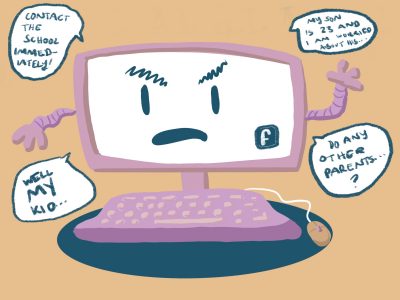The Boston University Parents Group, a private, BU parent-exclusive Facebook group, is self-described as a place for answers — answers, that is, for “all things BU,” a safe-haven for parents of new and old students looking for reassurance and responses to questions that often go unanswered by the University.
Most of the questions posed on the page are pretty benign — concerns over bad chemistry grades and fears over the uncertainty of study abroad programs.

But the reason why I became interested in the page was because of a column I wrote a few weeks ago related to the Israel-Hamas war. I’d heard that several posts had been uploaded to the parents page concerning a student protest named “Shut It Down For Palestine,” held in the Tsai Performance Center on Friday.
I’m not one to stifle an individual’s right to share an opinion — it would be pretty hypocritical of me to judge others for something I’m doing right now.
I’m of the perspective that debate over controversial topics — such as the Israel-Hamas war — is far better than silence. At the very least, it suggests a certain level of attention toward the problem at hand, even if that perspective might be better shared offline.
But the paramount issue seemed to me that the conversation taking place on the parents’ page wasn’t about the war at all — it was about the effect of the protest on their children.
In the comment section of one of the images, for example, a BU parent lamented the fact that their child was “blocked” from a classroom, although this claim was refuted by another parent. A second parent argued back, stating that while they disagreed with the student protesters’ cause, the protest seemed peaceful and, therefore, the other parent had no right to complain.
A third simply worried that their child might be trapped in a dangerous situation if the amount of people involved in the protest went over the limit stated in the building’s fire code.
To me, this issue seemed to totally encapsulate the nature of the BU parents’ page as an entity — an endless forum for parents of college students to stress over student situations far beyond the scope of their control.
This kind of behavior is plaguing parent-child relationships far beyond the scope of Facebook, but the pages themselves represent a larger trend of parents being overly involved in their children’s lives. Tracking apps such as Life360 and “Find My” have deepened the impact of this situation, potentially representing a growing distrust between parents and their children.
Research has been done on the negative impact of parental overinvolvement in their children’s lives. A study published in the National Library of Medicine found that “helicopter parenting,” defined as an excessive level of involvement and control by parents in their children’s lives, was directly correlated to increased levels of depression and anxiety in adolescents.
Another study, published in the Developmental Psychology Journal in 2018, discovered that parental overinvolvement in children’s lives “can negatively affect a child’s ability to manage his or her emotions and behavior.”
While both studies focus on a younger demographic of children, I think that the principles discovered by the study can be applied to college students.
Allowing parents to influence decisions and opinions regarding campus life for their children means that students themselves are stifled from developing their own ability to handle difficult situations.
Relying on a Facebook page to remedy the fears caused by minimal to maximal conflicts, from a bad grade on a test to a controversial war overseas, does nothing other than solidify the pattern found in both studies — one which increases anxiety for students and parents alike.
I still understand the potential value found in a parents’ page. College is a period of uncertainty for students and parents, and it is a little absurd that we’re expected to step into an unknown environment blindly and adapt automatically and seamlessly.
Facebook parent pages provide parents — and, by association, their children — with a community that is actively expressing those same fears. Even if the community can’t provide a solution for the problems they have, the expression of those fears is often enough to soothe the most tempestuous and irrational worries.
And yes, often, it is easier to deal with our insecurities when we know others have the same ones. Facebook pages offer a solace for parents who are divided from their children by the barriers of distance and lifestyle changes that going off to college creates.
But even so, I think both students and parents would benefit from a bit of independence from each other — even if that does mean getting a bad grade or missing out on an experience.
There are a multitude of ways for parents to support their children through this new experience in their life, even through the convoluted pathways of controversial issues and housing dilemmas. Facebook may be a convenient answer, but I find it hard to believe it’s the most beneficial.






















































































































